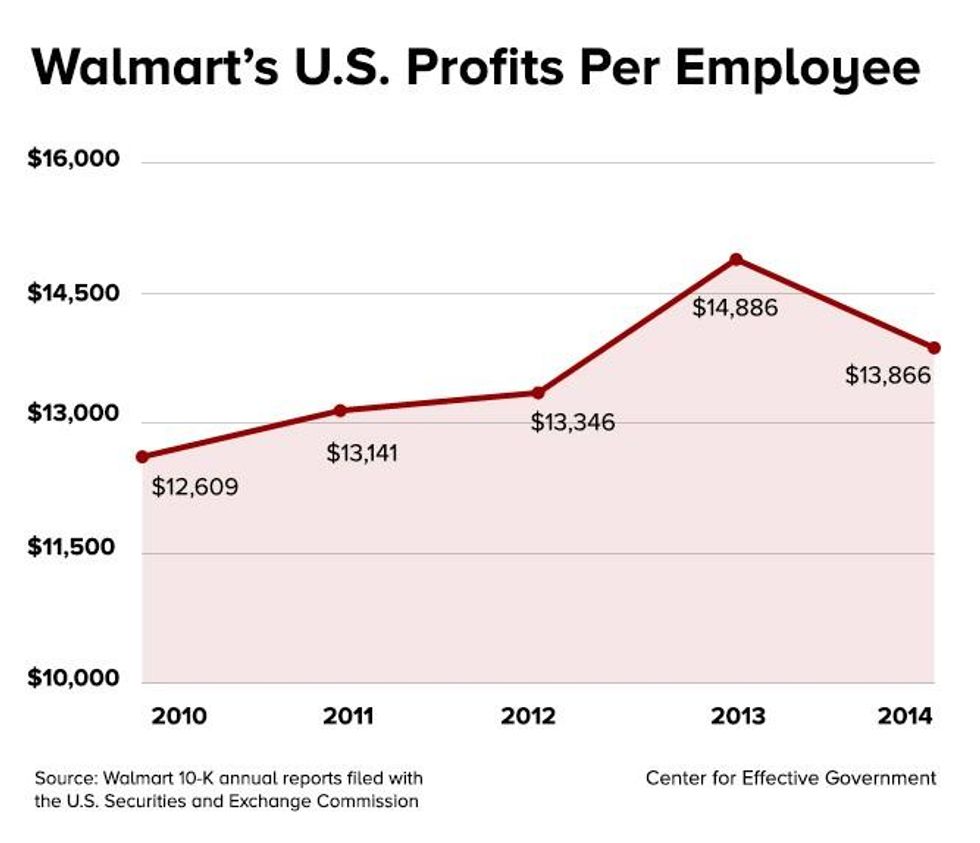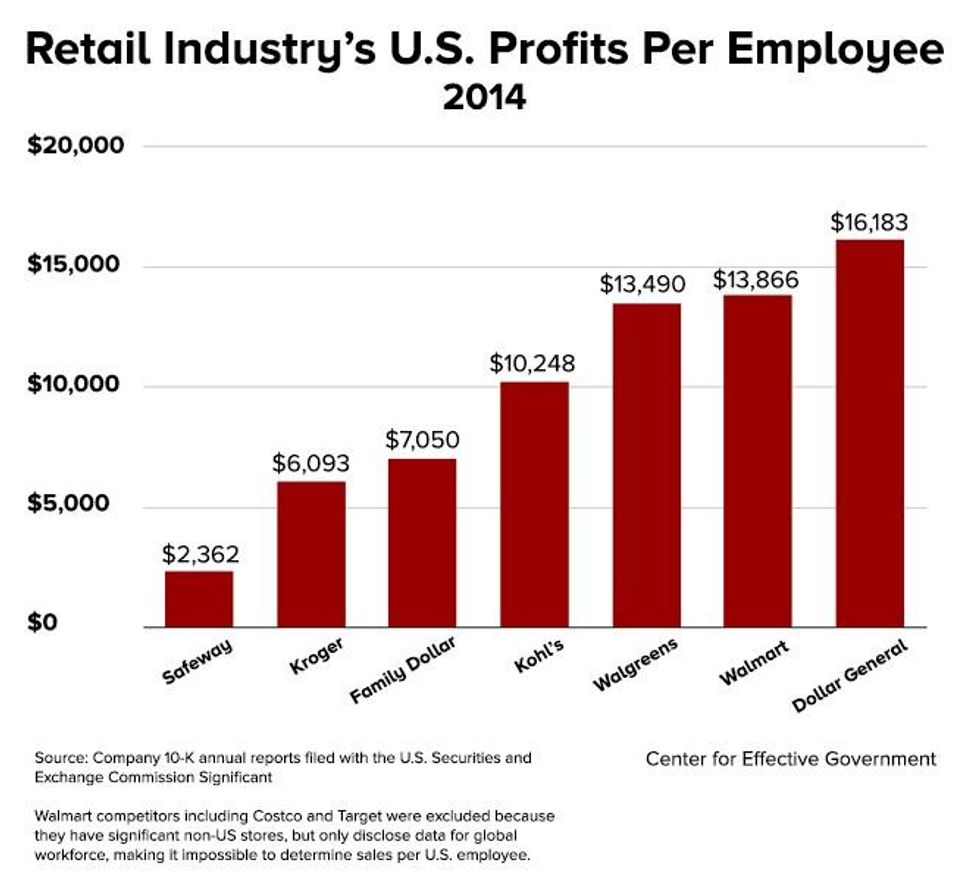

SUBSCRIBE TO OUR FREE NEWSLETTER
Daily news & progressive opinion—funded by the people, not the corporations—delivered straight to your inbox.
5
#000000
#FFFFFF
To donate by check, phone, or other method, see our More Ways to Give page.


Daily news & progressive opinion—funded by the people, not the corporations—delivered straight to your inbox.

Over the last three years, strikes and pickets by Walmart's low-wage employees have steadily expanded. Last Black Friday, protests were staged at more than 1,000 Walmart stores across the U.S. Dozens of employees were arrested.
Late last month, the nation's largest private employer finally responded by agreeing to raise its workers' pay to $9 an hour by April and $10 an hour by next February. The announcement means half a million Walmart employees - almost 40 percent of the company's U.S. workforce - will be getting a raise, including 6,000 who currently make the federal minimum wage of $7.25 an hour.
After the raise, the lowest paid full-time Walmart worker will be making $20,080 a year; the typical 28-hour per week part-time employee, $14,560. The poverty line for a family of three is $20,090.
Walmart's exceedingly low-wage structure has forced many of its employees onto public assistance programs to supplement their earnings. Public nutrition, health care, and housing assistance provided to Walmart workers cost U.S. taxpayers $6.2 billion a year, according to a 2014 study by Americans for Tax Fairness. Walmart's recent announcement will lower, but not eliminate, the subsidies the American people pay to Walmart.
Walmart's retired CEO makes $1,070 an hour, even while he sleeps.
By contrast, Walmart's former CEO, Mike Duke, earned $44 million in his last three years at the company's helm - $4,751 an hour assuming a 60-hour workweek - and left with a retirement package valued at $140 million. If Mr. Duke converted his golden nest egg to an annuity, he would receive a monthly check for $770,000 - $1,070 per hour around the clock, even while he is sleeping.
But wait, it gets even more unfair: the Walton heirs "earned" $445,776 an hour on the increase in the value of the stocks they inherited - in just the last five years.
Together, Walton's daughter-in-law, Christy, and children Alice, Jim, and Rob Walton own half the company's stock and had a combined net worth of $157.5 billion last year, an amount equal to the combined net worth of 42 percent of America's families. They occupy slots six through nine on the Forbes 400 list of richest Americans.
While low-income Americans struggled through the Great Recession, the Waltons have seen their combined wealth more than double since 2009 (when it was just $79.4 billion). If their wealth gain over the last five years was converted to an hourly wage, each of the four would have "earned," on average, $445,776 each and every hour for the last five years.
The good news: the race to raise the wage floor in the retail sector is on.
Walmart was not the first retailer to significantly increase pay for workers at the bottom of the pay ladder. Furniture retailer IKEA announced it would increase the average minimum wage of its U.S. workforce to $10.76 an hour - with workers in low cost-of-living areas getting a boost to $8.69 an hour, and workers in highest cost-of-living regions seeing their paychecks bump to at least $13.22 an hour.
GAP also joined the wage-raising party last year, raising their workers' pay to $9 an hour in 2014, and $10 this year. Last month, health insurer Aetna raised the minimum pay for its lowest-wage workers to $16 an hour, which boosted pay for 12 percent of the company's workforce.
Costco, a direct competitor of Walmart's Sam's Club wholesale stores, uses a business model that stresses paying hourly workers well in order to keep turnover low. Costco pays its hourly workers an average of $20 an hour, far higher than the $11.39 an hour average for retail workers. Fewer than five percent of its workers leave each year.
Wal-Mart could do a lot more.
While Walmart's announcement is a step in the right direction, the company can and should do far more.
Today, Walmart generates pre-tax profits of $13,866 per employee in its U.S. operations. (Pre-tax profits are what remains after all of the expenses of the business - salaries, costs of merchandise, utilities, except taxes, are paid). Walmart's profits per employee are near the top of the retail industry. Moreover, Walmart's profits per employee have been trending higher over the last five years, having grown more than 10 percent since 2010.

Walmart also generates more profits from each employee's labor than most of its retail competitors.

Let's cheer for Walmart's wage announcement and then get back to pressuring the company to share more of its profits with the workers who have helped create such astounding wealth.
Dear Common Dreams reader, The U.S. is on a fast track to authoritarianism like nothing I've ever seen. Meanwhile, corporate news outlets are utterly capitulating to Trump, twisting their coverage to avoid drawing his ire while lining up to stuff cash in his pockets. That's why I believe that Common Dreams is doing the best and most consequential reporting that we've ever done. Our small but mighty team is a progressive reporting powerhouse, covering the news every day that the corporate media never will. Our mission has always been simple: To inform. To inspire. And to ignite change for the common good. Now here's the key piece that I want all our readers to understand: None of this would be possible without your financial support. That's not just some fundraising cliche. It's the absolute and literal truth. We don't accept corporate advertising and never will. We don't have a paywall because we don't think people should be blocked from critical news based on their ability to pay. Everything we do is funded by the donations of readers like you. Will you donate now to help power the nonprofit, independent reporting of Common Dreams? Thank you for being a vital member of our community. Together, we can keep independent journalism alive when it’s needed most. - Craig Brown, Co-founder |

Over the last three years, strikes and pickets by Walmart's low-wage employees have steadily expanded. Last Black Friday, protests were staged at more than 1,000 Walmart stores across the U.S. Dozens of employees were arrested.
Late last month, the nation's largest private employer finally responded by agreeing to raise its workers' pay to $9 an hour by April and $10 an hour by next February. The announcement means half a million Walmart employees - almost 40 percent of the company's U.S. workforce - will be getting a raise, including 6,000 who currently make the federal minimum wage of $7.25 an hour.
After the raise, the lowest paid full-time Walmart worker will be making $20,080 a year; the typical 28-hour per week part-time employee, $14,560. The poverty line for a family of three is $20,090.
Walmart's exceedingly low-wage structure has forced many of its employees onto public assistance programs to supplement their earnings. Public nutrition, health care, and housing assistance provided to Walmart workers cost U.S. taxpayers $6.2 billion a year, according to a 2014 study by Americans for Tax Fairness. Walmart's recent announcement will lower, but not eliminate, the subsidies the American people pay to Walmart.
Walmart's retired CEO makes $1,070 an hour, even while he sleeps.
By contrast, Walmart's former CEO, Mike Duke, earned $44 million in his last three years at the company's helm - $4,751 an hour assuming a 60-hour workweek - and left with a retirement package valued at $140 million. If Mr. Duke converted his golden nest egg to an annuity, he would receive a monthly check for $770,000 - $1,070 per hour around the clock, even while he is sleeping.
But wait, it gets even more unfair: the Walton heirs "earned" $445,776 an hour on the increase in the value of the stocks they inherited - in just the last five years.
Together, Walton's daughter-in-law, Christy, and children Alice, Jim, and Rob Walton own half the company's stock and had a combined net worth of $157.5 billion last year, an amount equal to the combined net worth of 42 percent of America's families. They occupy slots six through nine on the Forbes 400 list of richest Americans.
While low-income Americans struggled through the Great Recession, the Waltons have seen their combined wealth more than double since 2009 (when it was just $79.4 billion). If their wealth gain over the last five years was converted to an hourly wage, each of the four would have "earned," on average, $445,776 each and every hour for the last five years.
The good news: the race to raise the wage floor in the retail sector is on.
Walmart was not the first retailer to significantly increase pay for workers at the bottom of the pay ladder. Furniture retailer IKEA announced it would increase the average minimum wage of its U.S. workforce to $10.76 an hour - with workers in low cost-of-living areas getting a boost to $8.69 an hour, and workers in highest cost-of-living regions seeing their paychecks bump to at least $13.22 an hour.
GAP also joined the wage-raising party last year, raising their workers' pay to $9 an hour in 2014, and $10 this year. Last month, health insurer Aetna raised the minimum pay for its lowest-wage workers to $16 an hour, which boosted pay for 12 percent of the company's workforce.
Costco, a direct competitor of Walmart's Sam's Club wholesale stores, uses a business model that stresses paying hourly workers well in order to keep turnover low. Costco pays its hourly workers an average of $20 an hour, far higher than the $11.39 an hour average for retail workers. Fewer than five percent of its workers leave each year.
Wal-Mart could do a lot more.
While Walmart's announcement is a step in the right direction, the company can and should do far more.
Today, Walmart generates pre-tax profits of $13,866 per employee in its U.S. operations. (Pre-tax profits are what remains after all of the expenses of the business - salaries, costs of merchandise, utilities, except taxes, are paid). Walmart's profits per employee are near the top of the retail industry. Moreover, Walmart's profits per employee have been trending higher over the last five years, having grown more than 10 percent since 2010.

Walmart also generates more profits from each employee's labor than most of its retail competitors.

Let's cheer for Walmart's wage announcement and then get back to pressuring the company to share more of its profits with the workers who have helped create such astounding wealth.

Over the last three years, strikes and pickets by Walmart's low-wage employees have steadily expanded. Last Black Friday, protests were staged at more than 1,000 Walmart stores across the U.S. Dozens of employees were arrested.
Late last month, the nation's largest private employer finally responded by agreeing to raise its workers' pay to $9 an hour by April and $10 an hour by next February. The announcement means half a million Walmart employees - almost 40 percent of the company's U.S. workforce - will be getting a raise, including 6,000 who currently make the federal minimum wage of $7.25 an hour.
After the raise, the lowest paid full-time Walmart worker will be making $20,080 a year; the typical 28-hour per week part-time employee, $14,560. The poverty line for a family of three is $20,090.
Walmart's exceedingly low-wage structure has forced many of its employees onto public assistance programs to supplement their earnings. Public nutrition, health care, and housing assistance provided to Walmart workers cost U.S. taxpayers $6.2 billion a year, according to a 2014 study by Americans for Tax Fairness. Walmart's recent announcement will lower, but not eliminate, the subsidies the American people pay to Walmart.
Walmart's retired CEO makes $1,070 an hour, even while he sleeps.
By contrast, Walmart's former CEO, Mike Duke, earned $44 million in his last three years at the company's helm - $4,751 an hour assuming a 60-hour workweek - and left with a retirement package valued at $140 million. If Mr. Duke converted his golden nest egg to an annuity, he would receive a monthly check for $770,000 - $1,070 per hour around the clock, even while he is sleeping.
But wait, it gets even more unfair: the Walton heirs "earned" $445,776 an hour on the increase in the value of the stocks they inherited - in just the last five years.
Together, Walton's daughter-in-law, Christy, and children Alice, Jim, and Rob Walton own half the company's stock and had a combined net worth of $157.5 billion last year, an amount equal to the combined net worth of 42 percent of America's families. They occupy slots six through nine on the Forbes 400 list of richest Americans.
While low-income Americans struggled through the Great Recession, the Waltons have seen their combined wealth more than double since 2009 (when it was just $79.4 billion). If their wealth gain over the last five years was converted to an hourly wage, each of the four would have "earned," on average, $445,776 each and every hour for the last five years.
The good news: the race to raise the wage floor in the retail sector is on.
Walmart was not the first retailer to significantly increase pay for workers at the bottom of the pay ladder. Furniture retailer IKEA announced it would increase the average minimum wage of its U.S. workforce to $10.76 an hour - with workers in low cost-of-living areas getting a boost to $8.69 an hour, and workers in highest cost-of-living regions seeing their paychecks bump to at least $13.22 an hour.
GAP also joined the wage-raising party last year, raising their workers' pay to $9 an hour in 2014, and $10 this year. Last month, health insurer Aetna raised the minimum pay for its lowest-wage workers to $16 an hour, which boosted pay for 12 percent of the company's workforce.
Costco, a direct competitor of Walmart's Sam's Club wholesale stores, uses a business model that stresses paying hourly workers well in order to keep turnover low. Costco pays its hourly workers an average of $20 an hour, far higher than the $11.39 an hour average for retail workers. Fewer than five percent of its workers leave each year.
Wal-Mart could do a lot more.
While Walmart's announcement is a step in the right direction, the company can and should do far more.
Today, Walmart generates pre-tax profits of $13,866 per employee in its U.S. operations. (Pre-tax profits are what remains after all of the expenses of the business - salaries, costs of merchandise, utilities, except taxes, are paid). Walmart's profits per employee are near the top of the retail industry. Moreover, Walmart's profits per employee have been trending higher over the last five years, having grown more than 10 percent since 2010.

Walmart also generates more profits from each employee's labor than most of its retail competitors.

Let's cheer for Walmart's wage announcement and then get back to pressuring the company to share more of its profits with the workers who have helped create such astounding wealth.